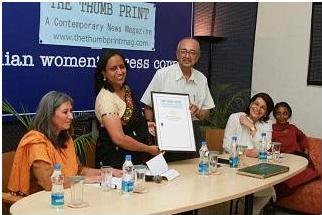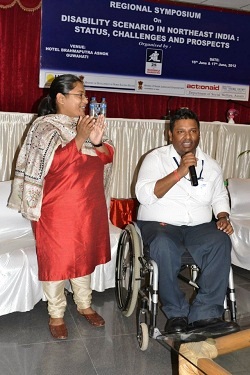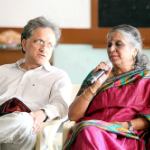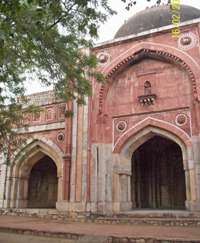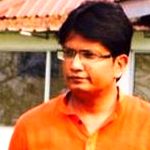Nowhere else has an abandoned air field put to better use than at Lekhapani under Margherita Subdivision on the eastern most part of Assam. Come winter, every January, the grass covered tarmac of World War II vintage comes alive with a thousand sounds of songs, dances and merriment as it plays hosts to the colourful three day Dehing Patkai Festival, one of the most prominent events in this region bound by the Patkai hills and the Burhi Dehing river.
In October 2010, I was posted as the Sub Divisional Officer of Margherita. One of my first tasks after joining my new posting was to prepare for the coming Dehing Patkai Festival. Though the Deputy Commissioner, Tinsukia, was the President of the Organising Committee of the Festival, it’s the Sub Divisional Officer, Margherita who, as the Working President, took all decisions on behalf of the former in consultation with the other members.
A mild winter day with clear blue sky and sunny weather greeted us on the morning of 16 th January 2011. There could not be a more perfect setting for the opening ceremony of the Dehing Patkai Festival. I was present at Lekhapani quite early in the morning, making a final check of the preparations at the ground. Rupon Das, a tent house owner from Ledo who had built the pandal with palm leaves on top was giving finishing touches to the huge structure. The stalls at the exhibition site were all occupied. The newly painted and decorated permanent stage of the Festival named Sukapha Ranga Mancha was kept ready for the inaugural meeting. The traditional huts of the tribes and communities had all opened their doors. Two months of preparations bore fruits. Everything was ready. A festive atmosphere prevailed on the ground and everywhere there was a mood of excitement.
Earlier as we had finalised the programme for the opening ceremony, a small controversy arose on the timing of the Tipam Puja., a worship of the mountain deity, Tipam, seeking his blessings before a shrine near the stage. Some of the Committee members wanted the puja to begin only after the arrival of the Chief Guest and the other guests. Others wanted the puja to begin on its own auspicious timing, regardless of the presence of the Guests. Finally it was decided in favour of the first option: the Tipam puja would begin only after the arrival of the Guests. I avoided taking sides on the issue but abided by the final decision.
Soon, the Chief Guest, the Minister of Cultural Affairs, Bharat Narah arrived along with local MLA and Industry and Power Minister, Prodyut Bordoloi. The Chief Guest was accompanied by his wife, Ranee Narah, Member of Parliament.
The opening ceremony began with the unfurling of the Dehing Patkai Festival flag by the Deputy Commissioner. The Chief Guest and the other Guests were then taken for a quick round of the ground. Before ascending the stage for the inaugural meeting, they stood before the small shrine of the Tipam deity and the Tipam Puja began. It was over within ten minutes.
The Chief Guest and the other Guests were then ushered on to the stage. The inaugural meeting began with a unique multilingual welcome chorus sung by youths of various communities of the region.
***
The opening ceremony was over by 2.00 pm. The guests were treated to a sumptuous buffet lunch of dishes from the ethnic cuisines of the region. Everything went off perfectly. The Festival ground was teeming with people. The main cultural function of the first day began on schedule at 4.00 pm. Partha Bairagi, my colleague who was in charge of the cultural programmes had a long line up of artists and troupes for the evening.
The function began on time with a Bihu dance by a troupe from Digboi. The guests had all left. After a busy morning, both Partha and I were now seated in a relaxed mood on a sofa in the front row. Partha’s wife and daughter and his father in law were seated behind us. Gradually, the pandal was getting filled up with people.
At around 6.00 pm, just few minutes into the performance by a Naga dance troupe, I got a call from one of our invited artists, the well known singer, Pulok Banerjee, informing me that he had just arrived in Margherita and was checking into his allotted room at the Dehing Guest House. As his programme was for the second day, I asked him if he would like to come over to the Festival ground that evening. Pulok Banerjee politely declined my invitation.
“I need to practice for some time. Besides there is a huge storm here with heavy rainfall; it is not possible to go out now. ” he said.
The news of the storm at Margherita, about fifteen kilometres away, surprised me. Till an hour back, there had been clear weather in Margherita. I spoke to Partha about the storm.
Even before he could respond we heard a low whistling sound and then a roar. The trees near the pandal swayed dangerously and sparks flew as some of the branches lashed against the temporary electric lines overhead.
All of a sudden, powerful winds accompanied by heavy rain swept across the ground. People rushed to take shelter here and there.The dancers stopped their performance midway and darted towards the green room. The huge pandal tilted to one side as the bamboo scaffolding gave away unable to hold the weight of the wet palm leaves on top. People rushed out as the pandal came crashing to the ground. I was one of the last persons to get away. The lights went out and everything came under pitch darkness. We took refuse on the stage. At that moment, my immediate concern was to make sure that nobody was trapped inside the fallen pandal. Suddenly, Monalisa, Partha’s wife screamed, “Where is Papa? He could not come out of the pandal.”
Partha rushed to the fallen pandal and frenetically tried to lift one end to search for his father in law under the debris. I tried to help him but had to retreat because of the heavy rain. Some army men from the nearby Assam Rifles camp joined in the effort. They flashed their torches under the pandal and one or two of them even crawled underneath. There was nobody under the pandal, they declared. Where did his father in law disappear? Partha turned ashen faced with anxiety. Just then, he located him crouching besides one of the giant speakers in front of the stage, trying to protect himself from the storm.
The storm lasted for about half an hour. By the time it subsided, the ground appeared like a battlefield. My heart sank as I surveyed the extensive damage it had caused. The two month long preparation seemed all in vain. Everything seemed to go down in those brief moments of nature’s fury. Besides the pandal, the bamboo and tarpaulin framed stalls of the Self Help Groups and entrepreneurs at the exhibition site also stood no chance against the heavy wind. Most of the stalls collapsed like nine pins. The storm came so suddenly that few could salvage their goods from the heavy shower that lashed the place. It was disconcerting to see the stall owners, lost and helpless amidst the ruins of their decorated stalls. Even the stage with the backdrop of a traditional Assamese hut, complete with areca nut trees suffered extensive damage. By a stroke of luck, only the traditional huts of the indigenous tribes and communities remained intact as they lay outside the destructive trail of the storm.
As the Working President of the Organising Committee, a heavy responsibility now fell on me. I must decide whether to continue or put off the Festival.
I informed the Deputy Commissioner about the storm. He had reached Tinsukia after attending the inaugural function.
Hearing my anguished voice, he advised me to remain calm. And true to his nature, he at once set off for Lekhapani. I also informed Prodyut Bordoloi about the devastation. Immediately he arranged for a Coal India team to proceed to the Festival ground to help us.
The Deputy Commissioner arrived at the ground sooner than I had expected. The Superintendent of Police accompanied him. The DC shook his head in disbelief as he surveyed the devastation with a powerful Dragon torch he carried with him. I discussed the situation with him and sought his advice. The Governor of Meghalaya would be the chief guest at the closing ceremony. Would it be possible to rebuild the pandal and organise the Festival in a manner befitting the visit of such a distinguished guest? The Deputy Commissioner took me aside and said, “There are two options available. Put off the festival for a later date. Nobody would criticise you. Or rebuild the pandal and go ahead with the Festival. Personally, I would opt for the second option. You could turn this misfortune into an opportunity to prove your capability. Whatever you decide please let me know in the morning. I have to convey it to the office of the Governor at Shillong”. Despite the DC’s reassuring presence, and his abundant support, both Partha and I were still wary about taking a decision immediately.
It was Bisa Nong Singhpho who goaded me into a decision. Bisa Nong popularly known as Raja was a direct descendent of the legendary Singhpho chieftain who had handed a wild tea plant to the Scotsman Robert Bruce leading to the historic discovery of tea in Assam. A gregarious person with a sharp wit, Bisa Nong could also be relied upon for astute advice on all matters.
“Raja Sahab, tell me, what should we do with the festival?” I asked him, He gave me a look of surprise and then his wrinkled face broke into laughter. “A wind came and blew away the pandal. Nothing more happened. We will build another pandal and the Festival continues” he said.
There was so much confidence in his words that they struck me like someone thumping me on the back. I could almost feel the negative thoughts draining out of me. I made up my mind. We will continue the Festival.
An impromptu meeting was held on the stage. We took a decision to rebuild the pandal and go ahead with the next two days programme.
Meanwhile the Coal India team had arrived with a dredger. It went into action to clear the ground of the debris of palm leaves from the fallen pandal. Army jawans from the nearby Assam Rifles camp along with Police personnel from Lekhapani Police Station also joined in the efforts. By midnight, the debris from the fallen pandal was cleared. At once, Rupon Das and his men started rebuilding the pandal. Before Bairagi and I left the ground for the night, I went to Rupon and holding his hand made a fervent plea, “Everything depends on how fast your Pandal comes up tomorrow”.
Rupon promised me that he would not let us down.
On our way home that night, I saw most of the welcome arches put up by various organisations damaged or lying on the road like uprooted trees. That night, I could not sleep out of sheer tension.
Early next morning, Partha Bairagi and I set off for the Festival ground. The weather was downcast but showed signs of clearing with the Sun occasionally peeping through the grey sky. We wanted to be on time to receive the participants of the Peace Marathon – a regular feature of the Festival-- from Patkai Stadium, Ledo to Lekhapani. After our vehicle reached Ledo and the road joined the legendary Stillwell Road, we were on the lookout for participants on the way. Earlier, Shyamal Kshetra Gogoi, our colleague, who was in charge of the sports and traditional games segment of the Festival had, rang to inform me that very few participants had come to take part in the Marathon. The previous night’s storm made people think that the event had been cancelled. I was disappointed not to find any participant on the way. Then about three kilometres from Ledo, we saw in front, a figure in white shorts trotting along. “Nareswar Hazarika”, I said loudly recognising him. A member of the Festival Organising Committee, this avid sportsman, touching seventy years, took part in the Peace Marathon every year and always made it to the finishing line. As our vehicle passed him, I gave him the thumbs up sign. He waved back. A little ahead, we came across another participant and several further down the road. The Peace Marathon was on. I was greatly relieved. A sizable crowd was waiting at the finishing line, near the main entrance of the Festival Ground to cheer the participants. A young man from Mangaldoi won the event. Nareswar Hazarika took his own time completing the Marathon but he got the loudest cheers for his unflagging enthusiasm.
The successful completion of the Peace Marathon came as the harbinger of good fortune for us. All night long, I had kept worrying about the uphill task of rebuilding the pandal.
Now what we saw before us was quite amazing. Overnight Rupon and his men had been able to completely rebuild the bamboo structure of the pandal. Only the barricading of the sides was left to be done. Instead of palm leaves, tarpaulin sheets would be used this time to cover the pandal top. I rushed towards Rupon, and clasped his hands.
“You kept your words.” I exclaimed with joy.
Rupon nodded his head. He was too tired to respond properly. That morning, Rupon and his men were the unsung heroes of the Dehing Patkai Festival. The rebuilding of the pandal ensured that the Festival would continue as scheduled. I was overjoyed.
I informed the Deputy Commissioner about our decision to stick to the original programme of the Festival.
Most of the stalls at the exhibition site also reopened and the owners resumed business with renewed gusto. The weather cleared completely. By noon, the Festival ground was packed with people. The traditional sports and games meet was held on the middle of the ground. Everything was back to normal.
During the course of the day, I heard a strange story making the rounds at the Festival ground on the previous evening’s storm. The storm was caused by the curse of the Tipam deity for the improper manner in which the puja had been performed before the inaugural meeting of the Festival. The organisers were blamed for their decision to begin the puja only after the arrival of the guests, ignoring the auspicious timing of the rituals. The rituals were also performed in a slip shoddy and perfunctory manner. Some of the organising committee members seemed perturbed by the story. But others like me did not give much credence to it at that time. We went ahead with the Festival without any second thought. By the time the main cultural function in the evening of the second day began, there was no trace of the previous day’s storm on the ground. Things went off without any hitch. That evening, when Pulok Banerjee sang from one of his evergreen songs, Par hoi gol dhumuha ejak, bhangi thoi gol mur poja ( a storm passed ,breaking down my hut) , all of us became misty eyed.
At the closing ceremony on the third day, the Chief Guest, the Governor of Meghalaya, Ranjit Shekhar Mushahary gave a brilliant speech delivered extempore on the significance of the Dehing Patkai region.
He mentioned the epic journey of Swargadeo Sukapha and his entry into this region through the passes of the Patkai hills. Today as the region is poised to become a hub of the Look East Policy, a spirit of accommodation amongst the tribes and ethnic groups living here is as important as the spirit of assimilation, if not more. The Dehing Patkai Festival is a symbol of this spirit of accommodation. Wrapped in a fiery red and black shawl gifted by the Sema Community of Lekhapani during the round of felicitations, the Governor’s evocative words matched his tall personality. As the Chief Guest, released the traditional paper lanterns known as Fanoosh into the evening sky to bring good luck and prosperity for all, I was a contended man. Surely the Tipam deity had forgiven us.
But significantly, people had not forgotten the story of the curse of Tipam. Even now, people still recalled how the curse of the Tipam deity brought the pandal crashing down. From local hearsay it gradually took on the status of a contemporary legend, going beyond the boundaries of Margherita. At a conference held in Singapore in October 2012, Dr Meenaxi Barkataki, an anthropologist of Assamese origin settled in Germany made the story of the angry Tipam deity the high point of her presentation on the Dehing Patkai Festival, much to the interest of the gathering of anthropologists from many countries.
And for me, the curse of the Tipam deity turned into a blessing. It redeemed my faith – and that of others – in my own ability to turn things around.








